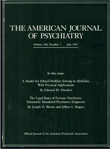Attentional functioning in schizotypal personality disorder [published erratum appears in Am J Psychiatry 1997 Aug;154(8):1180]
Abstract
OBJECTIVE: Previous research has shown biological, phenomenological, and cognitive similarities between schizophrenic patients and individuals with schizophrenia-related personality disorders and features. Evidence further suggests that of these common dysfunctions, abnormal attention is one of the most promising indicators of a biological susceptibility to schizophrenia-related disorders. Although attentional dysfunctions have been reliably detected in schizophrenic patients as well as in a variety of populations at risk for schizophrenia, few studies have investigated attention in clinical patients with schizotypal personality disorder. In this study, the extent of attentional impairment was assessed in subjects with schizotypal personality disorder, normal comparison subjects, patients with other personality disorders, and schizophrenic patients. METHOD: Thirty subjects with schizotypal personality disorder, 35 subjects with other personality disorders (i.e., clinic patients with non-odd cluster personality disorders), 36 subjects with schizophrenia, and 20 comparison subjects who did not meet criteria for any axis I or axis II disorder participated in this study. All subjects were diagnosed according to DSM-III criteria. Attention was assessed by using the Continuous Performance Test, Identical Pairs Version. RESULTS: Analyses indicated that subjects with schizotypal personality disorder, like schizophrenic subjects, performed significantly worse than comparison subjects on both the verbal and spatial tasks of the Continuous Performance Test, Identical Pairs Version. In contrast, patients with other personality disorders performed similarly to comparison subjects across conditions. CONCLUSIONS: These results suggest that patients with schizotypal personality disorder are impaired in their attentional functioning relative to normal comparison subjects and that they display deficits that are similar to the pattern characterizing schizophrenic patients.



